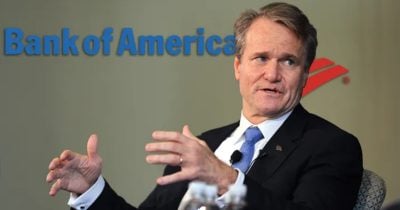ARTICLE AD
Moynihan doesn't see crypto as an immediate threat to the US dollar's dominance.

Photo: Pat Greenhouse/Getty Images
Key Takeaways
Bank of America is prepared to enter the crypto market upon receiving regulatory clarity. The bank's focus would be on regulated, non-anonymous transactions. <?xml encoding="UTF-8"?>US banks are eager to adopt crypto for transactions if regulatory guidelines are set forth., said Bank of America CEO Brian Moynihan in a Tuesday interview with CNBC’s Squawk Box.
“If the rules come in and make it a real thing that you can actually do business with, you will find the banking system will come in hard on the transactional side of it,” said Moynihan when asked whether he thought his bank would go full on in the crypto business within the next one to two years given President Donald Trump’s pro-crypto stance.
“Non-anonymous transactions, verified,” he added.
Moynihan also noted that the bank already handles most money movements digitally.
“We already move the vast majority of our money digitally. Our consumers do or companies do it,” he said.
When asked if he saw crypto and Bitcoin as a threat to the US dollar, Moynihan said he viewed crypto as potentially another payment option alongside existing methods like “Visa, Mastercard, debit card, Apple Pay.”
The main obstacle is the current lack of regulatory clarity, but once that’s resolved, he expects the banking system to become a major player in the crypto transaction space.
“I think if it becomes regulatory okay, which it wasn’t before. That’s the issue, you will see the banking system enter. We have hundreds of patents on blockchain already,” he stated.
“I think you will see the banking street make moves,” he added.
US banks have been cautious about engaging with crypto companies due to regulatory uncertainties and concerns about the risks associated with crypto assets.
The situation has become more complicated since the previous administration under former President Biden allegedly conducted a campaign to restrict banks from developing crypto-related services, commonly referred to as “Operation Choke Point 2.0.”
One key policy contributing to this environment was the SEC’s Staff Accounting Bulletin (SAB) 121, which required banks to classify customer-held crypto as liabilities on their balance sheets. This rule created barriers for banks to offer crypto custody services, discouraging many institutions from pursuing crypto-related initiatives.
As a result, numerous US financial institutions have either paused or slowed down their crypto projects. Many crypto businesses have opted to leave the US market in favor of jurisdictions with clearer and more supportive regulations.
This is expected to change under the Trump administration. Trump has pledged to repeal SAB 121 and end “Operation Choke Point 2.0,” aiming to promote a supportive environment for US crypto businesses.
Disclaimer
 12 hours ago
7
12 hours ago
7 

